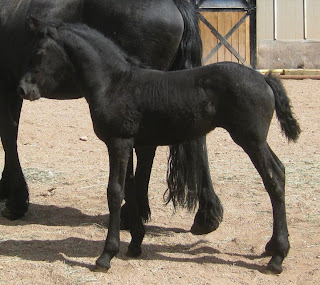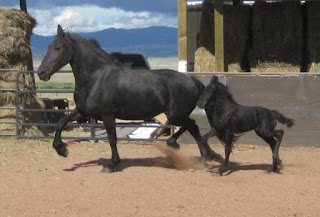We want to share our situation and some of the information that we found when we started trying to help our premature foal.
We noticed that the first day she spent most of the time on the ground “pushing” herself in circles. She was obviously very small but her behavior was very “fetal” she was moving around on the ground as if she was still in her mom. She was clearly mentally/behaviorally not ready to be born. With her not getting up we were giving colostrums and feeding her. It’s good that we didn’t force her getting up because we found out later that there was a HUGE chance that her joints were not ready for her to get up. There was a case where a foal was born early and they had to actually keep the foal strapped down so that he didn’t crush his joints that were all cartilage. Her x-rays came out healthy at a week and her follow up x-rays were very healthy so we got lucky. But now that we know more about the premature foals joints we thought that it was important to share so that you can prevent lifelong damage to the foals joints.
 We also noticed that her skin was like tissue paper. It was delicate and would snag on everything. It was so sensitive that even the straw bedding was tearing her skin. She got open sours on all her joints. We dressed her in a spandex jacket and wrapped her fetlocks to protect her but even the skin around her eyes was very delicate. She was put on several antibiotics to protect her from infection but she was falling apart with every move. This situation can commonly be called Joint Ill. It’s an infection that affects foals and appears in the joints. She developed a bladder infection despite all the antibiotics. The signs of this was that the foal was peeing out her umbilical cord. She got special iodine treatments to her umbilical cord to treat this infection. She was under attack from the world.
We also noticed that her skin was like tissue paper. It was delicate and would snag on everything. It was so sensitive that even the straw bedding was tearing her skin. She got open sours on all her joints. We dressed her in a spandex jacket and wrapped her fetlocks to protect her but even the skin around her eyes was very delicate. She was put on several antibiotics to protect her from infection but she was falling apart with every move. This situation can commonly be called Joint Ill. It’s an infection that affects foals and appears in the joints. She developed a bladder infection despite all the antibiotics. The signs of this was that the foal was peeing out her umbilical cord. She got special iodine treatments to her umbilical cord to treat this infection. She was under attack from the world.
Giving her colostrums orally and from her mom was not doing her much good. Her intestines were too premature to actually absorb the colostrums. We tested her levels and they were very low. She needed a plasma transfusion. The coolest thing happened after the transfusion. Within 2 hours of the transfusion her skin started reattaching to her body. The tissue paper affect stopped and healing started right before our eyes.
To heal all the wounds where her skin peeled back we used Doc Underwoods till they were sealed then to get the hair to grow back without having white hair grow in we used Dynamite’s Wound Balm. http://sableranch.net/woundbalm.html . Today she has NO WHITE hairs!!! Not one scar and that is AMAZING. Friesians are not allowed to have white markings and if they do get them from injury then you have to present a vet’s explanation of the injuries. That makes it very important that the Friesians not get white hair when they have an injury.
In short, check your foals IgG levels, take extra caution with the joints of a premature foal, and take care of your wounds so that you don’t get long term white hairs.
This filly at age 2.5 years old!
Entered into the studbook with the KFPS at 2.5 yo (normally 3yo) which is proof of soundness and confirmation quality! (photo Nadeen Davis)




Hi this was a gud help but information was for wrong breed sadly we have half a thorabreed mare and sadly she lost her foal 2 night the foal was 6 months premature and we cud not save it we lost the foal on the 1/12 /2011 if ya have any information on wat we could do to provent this happening again could u text me or ring me ony dis number from cluless 0894405044 ps was mares first foal she 3 yrs old
ReplyDeleteHello, I have posted a blog about late term loss that may possibly help with your situation. Without knowing the exact circumstances the two most likely explanations are placentitis or deformity such as not developing an organ that would be essential to carry to term.
DeleteThis comment has been removed by the author.
ReplyDelete